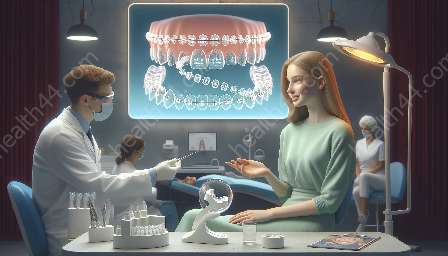Dental health is a critical aspect of overall well-being, and its long-term effects have a significant impact on one's quality of life. This article aims to delve into the long-term implications of dental health and compare Invisalign with traditional braces to offer a comprehensive understanding of their roles. We will examine how both options influence dental health in the long run and explore their benefits and potential impacts.
Invisalign vs. Traditional Braces: A Comparison
When considering orthodontic treatments, two popular options often come to mind: Invisalign and traditional braces. Both aim to correct dental misalignments and improve oral health, but they differ in various ways. Understanding the long-term effects and impact of these treatments on dental health can help individuals make informed decisions about their orthodontic care.
Long-Term Effects and Impacts on Dental Health
Proper dental health contributes to a person's overall well-being, affecting their ability to eat, speak, and maintain self-confidence. The long-term effects of dental health encompass various aspects, such as tooth decay, gum disease, jaw alignment, and overall oral hygiene.
Tooth Decay
Untreated dental issues can lead to tooth decay, commonly known as cavities. Cavities may affect the overall structure and strength of the teeth, leading to long-term oral health complications if not addressed promptly and effectively.
Gum Disease
Poor dental care can contribute to gum disease, affecting the gums and bone supporting the teeth. Long-term effects of gum disease may include tooth loss, discomfort, and potential impacts on overall health, as gum disease has been linked to conditions such as heart disease and diabetes.
Jaw Alignment
The alignment of the jaw plays a crucial role in overall dental health. Misaligned jaws can lead to issues such as temporomandibular joint disorder (TMJ), causing pain, discomfort, and difficulty in chewing or speaking. Addressing jaw alignment concerns is essential for long-term dental health.
Overall Oral Hygiene
Consistent and effective oral hygiene practices are fundamental for preserving dental health. Long-term impacts of neglecting oral hygiene may involve various complications, including bad breath, tooth discoloration, and an increased risk of developing tartar and plaque, leading to more severe dental issues.
Invisalign and Its Long-Term Impact
Invisalign, a modern orthodontic treatment, offers an alternative to traditional braces. Its clear aligners provide a discreet and convenient way to straighten teeth and correct misalignments. Invisalign's long-term impact on dental health includes improved aesthetics, easier oral hygiene management, and reduced discomfort compared to traditional braces.
Aesthetics
One significant benefit of Invisalign is its nearly invisible appearance. This aesthetic advantage can positively impact individuals' self-esteem and confidence during and after treatment, contributing to their long-term well-being.
Oral Hygiene Management
The removability of Invisalign aligners allows for easier maintenance of oral hygiene. Unlike traditional braces, which can pose challenges in cleaning and flossing, Invisalign aligners can be removed for thorough dental care, potentially leading to better long-term oral health outcomes.
Reduced Discomfort
Invisalign aligners are designed to be more comfortable than traditional braces, as they lack metal wires and brackets that can cause irritation and discomfort. This enhanced comfort during treatment may contribute to a positive long-term experience for individuals undergoing orthodontic care.
Traditional Braces and Their Long-Term Effects
Traditional braces have been the conventional method for correcting dental misalignments and addressing orthodontic issues. While effective, they come with unique considerations regarding their long-term impact on dental health, including potential effects on oral hygiene and overall comfort.
Oral Hygiene Challenges
Metal braces can present challenges in maintaining optimal oral hygiene. Food particles and plaque may easily accumulate around brackets and wires, requiring extra care and specialized cleaning tools to prevent long-term dental issues such as cavities and gum disease.
Potential Discomfort
Traditional braces may cause discomfort and irritation, particularly during adjustments or repairs. While this discomfort is often manageable, it can impact a person's experience throughout the treatment duration and potentially influence their long-term attitude toward dental health.
Choosing the Right Option for Long-Term Dental Health
When considering orthodontic treatments, individuals must weigh the long-term effects and impacts on their dental health. Factors such as aesthetics, oral hygiene management, and overall comfort play significant roles in making an informed decision between Invisalign and traditional braces.
It is essential to consult with a qualified orthodontist to discuss individual needs and preferences, enabling informed decision-making for long-term dental health and well-being.


